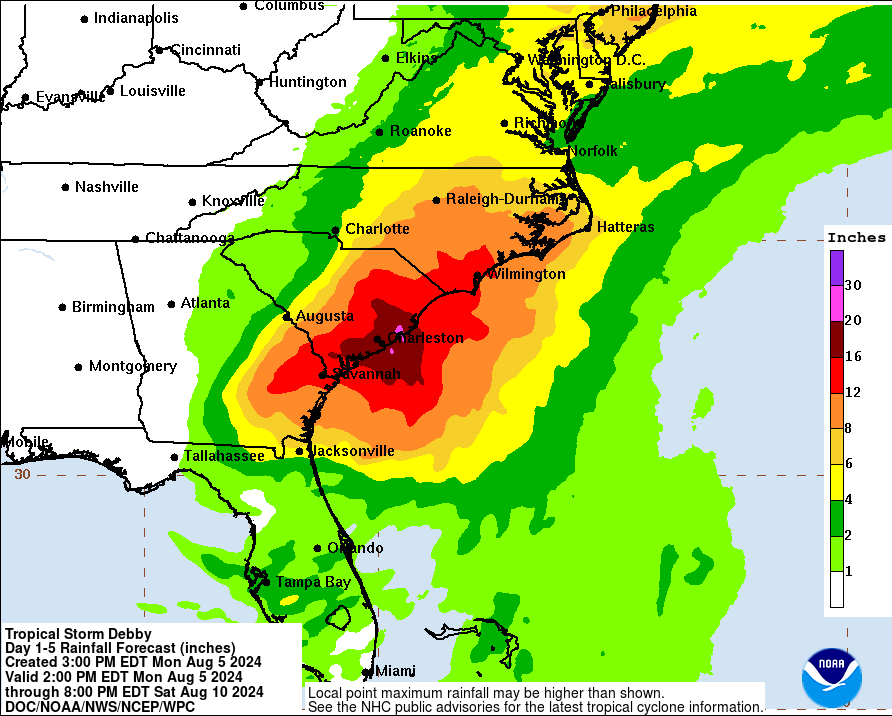As the rain began to fall across South Georgia, residents from Valdosta to St. Simons Island spent Monday loading up on generators, assessing drinking water supplies and moving cattle to safety ahead of the potentially “historic” deluge Tropical Storm Debby was expected to bring.
Debby made landfall early Monday morning as a Category 1 hurricane near the town of Steinhatchee in Florida’s Big Bend region with sustained winds of 75 miles per hour. After pushing onshore, Debby was downgraded to a tropical storm and the National Hurricane Center (NHC) said in its 2 p.m. advisory on Monday it expects Debby to gradually weaken as it begins curling across North Florida and into southeast Georgia.
Debby has already been blamed for several deaths, including of a 13-year-old boy who was crushed inside his Florida home by a fallen tree, according to the Levy County Sheriff’s Office. Traffic deaths were also reported, including a semi-truck driver who was killed when his vehicle went into a canal in the Tampa area.
For Georgia, the primary concern from the storm is the moisture it is carrying and already soils are saturated.
“We have one farm in my area that had 21 inches of rain in July alone,” said state Sen. Russ Goodman, a South Georgia farmer. “Whoever has been praying for rain can stop now.”
As Debby moves inland, the NHC said it expects the currents steering it to collapse and for the storm’s movement to slow to a snail’s pace. That could allow the storm to dump potentially catastrophic amounts of rain on places like Savannah, Charleston and towns in between.
While rainfall totals projected Monday for Savannah were down slightly from what was forecast over the weekend, the city could still receive between 12 and 16 inches of rain over the next several days, according to the NHC’s 2 p.m. Monday projection. Farther north, places like Beaufort, Charleston and Hilton Head Island, South Carolina, could see 20 inches or more.
Credit: NOAA
Credit: NOAA
If the forecast proves accurate, Debby could rival Tropical Storm Alberto as the state’s most significant rainfall event. In July 1994, Alberto dumped more than 21 inches in a single day on Americus, Georgia. The total rainfall measured from the storm at the same site was nearly 28 inches.
On Monday, as Debby’s outer rain bands soaked Valdosta, residents there were busy buying supplies.
At a Lowe’s on St. Augustine Road, a store employee said he had sold about 30 generators in three hours.
One of those was purchased by Carl Slocumb, who lives on the north side of town. As he strapped the new unit to the bed of his Jeep, he said he hoped to keep food in his refrigerator from spoiling if he loses power.
“What’s ironic is last year when Idalia came through, I told my wife, ‘We’re not going to go through this again. We’re going to go get a generator,’” he recalled. “That was almost a year ago and we didn’t. So here we are.”
As of about 4 p.m. Monday, more than 10,000 Georgia Power customers were without power, with most clustered around Valdosta. Another 40,000 customers of rural electrical membership cooperatives (EMCs) were also without electricity.
The slow churning storm had also forced Hyundai Motor Group to close its sprawling Coastal Georgia electric vehicle factory at noon. The plant officially starts production later this year, but workers began preparing storm drains, on-site retention ponds and other infrastructure ahead of Debby’s landfall, a spokesperson for the factory said.
Hyundai’s leadership said it would monitor the weather to determine whether the plant will remain closed the rest of the week.
Echoes of Hurricane Harvey
With soils on Georgia’s coastal plain already saturated from recent rains, officials and experts worried Debby’s deluge could overwhelm stormwater drainage infrastructure and cause devastating flooding.
After declaring a state of emergency on Saturday for all of Georgia’s 159 counties, Gov. Brian Kemp took another step Monday and called up 2,000 Georgia National Guard troops to be used in storm “preparation, response and recovery efforts.”
Chris Stallings, director of the Georgia Emergency Management and Homeland Security Agency, had a simple message for Georgians in the path of the heaviest rains: “Get out.”
“Just because the system isn’t a hurricane doesn’t mean that it’s not going to be impactful,” Stallings said at a news conference on Sunday. “Some of our most impactful floods have been tropical storms and tropical depressions here in Georgia.”
Savannah Mayor Van Johnson also warned Sunday that rainfall rates of greater than 2.5 inches in an hour would test the city’s sewer system.
Credit: Katelyn Myrick/AJC
Credit: Katelyn Myrick/AJC
Debby is not nearly as strong as Hurricane Harvey, which made landfall as a Category 4 storm in 2017 and dumped between 40 and 60 inches of rain on parts of the southeast Texas, including Houston. Harvey was one of costliest storms in U.S. history and was directly responsible for dozens of deaths, nearly all of which were caused by freshwater flooding.
Marshall Shepherd, the director of the University of Georgia’s Atmospheric Sciences Program and a meteorologist, said he doesn’t expect destruction from Debby to be on par with Harvey, but said the storm’s sluggish movement and rainmaking ability is reminiscent.
“I think Georgians haven’t really experienced anything like that, and that’s what particularly concerns me,” Shepherd said.
All the water expected to fall from the sky could also compromise local authorities’ ability to treat drinking water and sewage.
By noon on Monday, the city of St Marys near the Florida border had already recorded 2 inches of rainfall, according to Bobby Marr, the city’s public works director.
He said heavy rain puts pressure on local lift stations, which pump sewage from lower elevations to higher elevations. In 2017, the 10 inches of water Hurricane Irma dumped on the city knocked all 76 of the its lift stations offline.
“On the wastewater side, rain hurts big time,” Marr said.
On Monday, all of the town’s lift stations were still functioning, but Marr warned residents should brace for sewage backups and stockpile drinking water, or prepare to boil their water.
Pecans, cattle feed at risk
The storm is also causing angst for South Georgia farmers who have been battered by a string of disasters in recent years.
Just last year, Hurricane Idalia’s 90 mile-per-hour winds left fields of cotton a twisted mess and felled hundreds of pecan trees in South Georgia. In the aftermath, the federal government issued a disaster declaration for a 27-county area.
Arren Moses, a pecan grower with about 700 acres of trees in Uvalda, a small town 100 miles west of Savannah, said he was worried winds could topple trees with the soil already saturated after a wet season.
He said the pecan industry has been struggling since the Trump administration kicked off a trade war with China, previously a large export market for Georgia’s nuts.
“We needed a win,” Moses said. “We needed a good crop after the last several years of depressed prices. This hurricane could be very detrimental to the pecan business if we get a massive amount of damage.”
Handy Kennedy, a cattle farmer in Cobbtown, Georgia, about 75 miles west of Savannah, was busy Monday moving his 200 Black Angus cattle to higher ground.
Cows require certain levels of protein in their diet and Kennedy said he was concerned about how the storm would impact the hay they rely on. If the storm keeps him out of the fields for too long and the grass’ nutritional content dwindles, he said he would need to supplement it with other feed.
“Nobody can really predict what Mother Nature is going to do,” Kennedy said.
Power outage response
Georgia Power and groups representing the state’s dozens of electric membership cooperatives (EMCs) — which mostly serve rural areas — said they were preparing to respond to power outages.
Georgia Power, which has 2.7 million electric customers in the state, said Monday is had mobilized extra staff to respond to potential outages and damages to its system. The company’s “Mobile Command Center,” a tractor trailer equipped to coordinate responses to extreme weather, has also been deployed to South Georgia.
Georgia EMC — a trade association representing the state’s 41 electric cooperatives, plus affiliated electricity producers and distributors — said it had been preparing for several weeks, after the federal government predicted an extremely active hurricane season.
“We’ve used our time wisely since we began monitoring Hurricane Debby last week, and EMCs in the storm’s path have enacted their proven storm response plans, taking the necessary steps to prepare for the storm,” said Harry Reeves, Georgia EMC’s vice president of training and safety.
— AJC staff writers Adam Van Brimmer, Greg Bluestein, Meris Lutz, Mirtha Donastorg and Rosana Hughes contributed to this report.
More developments
- At least four deaths have been blamed on Tropical Storm Debby as of Monday: A truck driver in the Tampa area; a 13-year-old boy southwest of Gainesville; and a 38-year-old woman and a 12-year-old boy in Dixie County, Fla.
- More than 300,000 customers remained without power in Florida and Georgia on Monday afternoon, down from a peak of more than 350,000
- More than 1,600 flights had been canceled nationwide, many of them to and from Florida airports
-----------------------------------------------------------------------------------
Metro Atlanta forecast
Today: Partly sunny. High of 91 degrees, low of 72 degrees
Wednesday: Partly sunny: High of 94 degrees, low of 74 degrees
Thursday: Mostly sunny : High of 90 degrees, low of 7 degrees
Source: Accuweather
Keep Reading
The Latest
Featured





